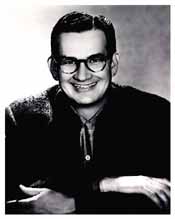
Hunter Hancock, 88, brought R&B to L.A. radio stations in 1940s
By Myrna Oliver, Los Angeles Times Staff Writer

Hunter Hancock, the legendary disc jockey regarded as the first in the western United States to spin rhythm and blues records and among the first to broadcast rock 'n' roll, has died. He was 88.
Hancock, a top Los Angeles DJ of the mid-20th century, died Aug. 4 of natural causes at a retirement complex in Claremont, said his daughter, Rosemary Davis.
Known on the air as "Ol' H.H.," Hancock, in his high-pitched, frantic, exaggerated voice, was heard over local airwaves from 1943 to 1968, hosting the Sunday show "Harlem Holiday" on KFVD-AM (later KPOP-AM); the daily "Harlematinee"; the KGFJ-AM nightly Top 20 "Huntin' With Hunter"; and the KGER-AM Sunday gospel show "Songs of Soul and Spirit."
He also had a brief run on KCBS-TV Channel 2 in 1955 with the Friday night show "Rhythm and Bluesville," interviewing such musicians as Duke Ellington, Fats Domino, Little Richard and the Platters.
In 1970, Hancock's voice introduced his R&B oldies anew via the "Cruisin' " album series, intoning his standard opening: "From bebop to ballad, swing to sweet, and blues to boogie … some of the very best in rhythm and blues records, featuring some of the greatest and most popular musicians, Negro singers and entertainers in the world." Hancock represented 1959 in the series, "Cruisin' the '50s and '60s" produced by Increase Records.
For several years, the Pulse survey, a precursor to Arbitron, rated Hancock's shows No. 1 among African American listeners in Southern California. In 1950, the Los Angeles Sentinel newspaper rated Hancock the most popular DJ in Los Angeles among blacks.
To the surprise of black and white audiences at live concerts, however, Hancock was white. Born in Uvalde, Tex., Hancock tried about 22 jobs in half a dozen years - salesman, bank clerk, chauffeur, drummer and singer. But he found work in radio.
KMAC-AM in San Antonio hired him to read commercials and news copy. Four months later, he was transferred to sister station KPAB-AM in Laredo as chief announcer and program director.
"I hated Laredo…. I fled Laredo at my first opportunity and took the train to Los Angeles," Hancock wrote in a 1999 article for the Doo-Wop Society of Southern California.
He landed a weekend announcer's spot on KFVD, a "sundown station" that went off the air at dusk. When Todd Clothes bought a one-hour program on Sundays specifying that it appeal to African Americans, Hancock became the host.
Still known as an announcer before the term "disc jockey" became popular, he played jazz recordings on the new show he dubbed "Harlem Holiday." Bandleader Chick Webb's "Holiday in Harlem" featuring Ella Fitzgerald became the theme song.
By 1947, Hancock was encouraged to add a daily half-hour show he called "Harlematinee," and he soon learned that jazz was not the only music that appealed to his audience. A Modern Records salesman bluntly told him, "Hancock … if you want to reach a huge Negro audience, you should be playing race records."
Hancock had no idea what "race records" were, but played two that the salesman offered. That attracted more record promoters, and within a week, Hancock told the Doo-Wop Society years later, "my show was 100% 'race music.' "
"Nowadays," he said, "we call it rhythm and blues. Without realizing it, I became the first disc jockey in the western United States to play R&B."
The daily R&B show became a hit and expanded to 3 1/2 hours. Hancock gained such a following that he was invited to host live talent shows at black clubs and a series of "Midnight Matinee" shows at the Olympic Auditorium and the Orpheum Theatre. His audience soon included Latinos and Anglos.
In 1956, with his own station off the air at night, Hancock began a 9 p.m. to 11:30 p.m. top 20 show, "Huntin' With Hunter," weeknights on KGFJ, where he started playing rock.
"At a time in which much of radio was confused over whether to stick with traditional pop music or venture into rock, Hancock was at his peak," Times pop music critic Robert Hilburn wrote in 1970. "He had been playing rhythm and blues records for years and was in the perfect spot when black music, not white imitations of it, came into style."
Hancock's career had its lows as well. He was convicted in 1962 and sentenced to probation for failing to report $18,000 income in his tax statements for 1956-58. Prosecutors said the money was payola from record companies bribing him to plug and play their records. Hancock testified that he considered the occasional cash to be gifts.
In 1959, along with Roger Davenport, Hancock started Swingin' Records with a debut hit, "There Is Something on Your Mind" by saxophonist Big Jay McNeely. They also released songs by Marvin and Johnny, Rochell and the Candles and the Hollywood Saxons, among others.
Although KPOP was sold and converted to country, Hancock remained at KGFJ through the 1960s. But he grew increasingly restive as program directors dictated what to play and what to say, and he left radio in 1968, to work in public relations for Western Outdoor News.
Hancock's wife of 41 years, Dorothy, died in 1999. In addition to his daughter, Rosemary, of Claremont, he is survived by two other children, Victoria Hawks and Myron Mills, of Roseburg, Ore.; six grandchildren, five great-grandchildren and two great-great-grandchildren.
Services are scheduled at 2 p.m. Aug. 28 at Claremont United Methodist Church, 211 W. Foothill Blvd., Claremont.
The family has asked that memorial donations be sent to Claremont United Methodist.